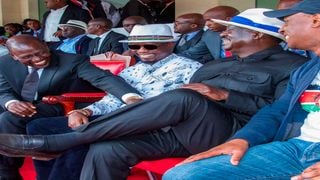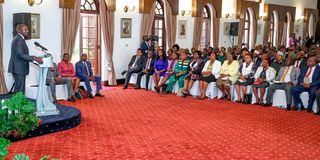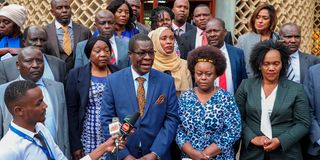
President William Ruto and Azimio leader Raila Odinga at Kipkeino Classic at Moi Sports Center Kasarani on May 13, 2023.
| PoolPolitics
Premium
Ruto rejects Raila’s offer on controversial tax proposals
President William Ruto’s camp has rejected proposals by MPs from Raila Odinga’s Azimio la Umoja One Kenya Coalition within the committee going through nearly 1,000 memorandums on proposed tax measures during a retreat in Naivasha, most of it against the provisions.
The National Assembly Finance and Planning Committee—already under strong accusations of being under the microscopic direction of the Executive not to touch a thing in the Finance Bill, 2023—instead wants the opposition MPs to propose amendments on the floor of the House once the report is tabled, a route Azimio sees as the wrong one to take.
It has emerged that President Ruto is only keen on having the committee review 15 per cent tax proposals on creative content.
He had promised artists to review the proposal downward during a meeting at State House.
Interviews with members of the committee, most of whom spoke off record, told Sunday Nation that the President seeks to have the Bill presented without major amendments back to the House for second reading and subsequently the Committee of the Whole House, where members will vote on each clause.
“The President has made it clear that he wants the Bill to proceed to the next stage with minor changes,” said a Kenya Kwanza MP sitting in the committee.
This comes as ODM leader Raila Odinga and Wiper counterpart Kalonzo Musyoka have hinted at the return of street protests against what they said is the failure by the Kenya Kwanza side to heed calls to review proposed punitive tax measures.
Speaking in separate functions yesterday, the duo said Kenyans are already too burdened by the cost of living and the taxes as is.
“We will not relent. Kenyans are already carrying such a heavy burden, and it is not fair to add more. Even worse, you are here handing government jobs to only those that voted for you. Why ask us to pay then?” asked Mr Odinga.

President William Ruto during the Kenya Kwanza Parliamentary Group Meeting at State House, Nairobi on May 23, 2023.
Mr Musyoka was more brutal, saying the only way to go about it is to go back to the streets to protest against the tax measures.
“We are saying the burden for many Kenyans, with Covid having hit and the cost of living high, is just impossible. Other governments are looking for ways to give some relief to their people. But here, they are adding more. I see the only response is tear gas and the streets,” Mr Musyoka said.
The opposition had sustained one month of weekly protests, before President Ruto called a truce and promised to address the opposition’s key concerns, including lowering the cost of living and reconstituting the electoral commission.
Withdrawn from talks
The opposition has since withdrawn from a 14-member bipartisan talks team—seven members from each side—over what they said was insincerity on the part of their Kenya Kwanza Alliance colleagues.
National Assembly Minority Whip Junet Mohamed (Suna East, ODM) yesterday accused President Ruto of refusing to allow for negotiations in settling some of the contested clauses.
“Since I got to Parliament, Finance Bills are the most negotiated Bills. You reach out to people and have a compromise, not forcing things the way this one is being done,” said Mr Mohamed.
He cited the housing levy where he suggested that the government can make it voluntary for one year at a reduced percentage for testing before making it mandatory.
“We can start by 1.5 per cent but on a voluntary basis then after seeing how it works, the government can make it mandatory after the people have seen how it operates. That is how Finance Bills work in this House,” Mr Mohamed said.
Another opposition MP holding a key position in the coalition, who spoke off record, revealed that there is “nothing concrete” on possible amendments based on the briefs the minority side get from its members sitting in the team.
“From the briefs that we have been getting from our members, there is nothing concrete coming from the committee. These committees, I can tell you, are all about the chairperson; if push comes to shove, the chair will have the final say on the report depending on what the executive wants,” said the official.

Azimio leaders led by National Assembly Minority leader Opiyo Wandayi during a press conference at Parliament Buildings on Thursday, June 8, 2023.
He hinted that the coalition is considering instructing its members in the team to write a minority report.
Minority reports have no consequences other than being in the record of the House since they are not subjected for debate in the House.
The committee chairman Kimani Kuria (Molo, UDA) has, however, indicated that there is room for amendments in the Bill—but only on the floor of the National Assembly.
“We are going clause by clause, thousands of documents. This is the most debated Bill in the history of this country. This is almost like we are doing a referendum or elections time. But we bear in mind that it is a very aggressive, dynamic Bill because we are looking at expanding our tax base and ensuring we raise revenue,” Mr Kuria said.
“Every Kenyan who spoke to us, we are listening and we are going to include the views, and it’s going to be more than 1,000 pages. Every clause matters. We cannot agree with everybody and we don’t take it for granted.”
Race against time
Claims of calls to some of the members of the committee have also emerged even as Sunday Nation learnt that the committee was racing against time to finalize its work yesterday and leave the secretariat to put up the final report today and tomorrow for adoption later on Monday ahead of tabling on Tuesday afternoon.
Some of the Azimio members sitting in the team said their colleagues from the ruling alliance are non-committal to some of the proposed amendments.
“When you raise an issue about fuel or housing levy, you see that nobody is interested in that debate; people have been warned against making any changes,” a member of the committee said.
“We are likely to finish today (yesterday), then leave the secretariat to put it together. If they finalise on time, then we will table it on Tuesday but that will depend on the amount of work that will go into it,” the member said.
MP Adipo Okuome (Karachuonyo, ODM), who is a member of the Finance committee and among the team in Naivasha, told Sunday Nation that he will oppose the Bill as it has failed to capture the proposals presented by the people.
Read: Raila Odinga vows to mobilise Kenyans to reject Finance Bill 2023
“I’m opposed to the Bill, especially those taxes that are being added against the wishes of the people. The Finance Bill should be passed keeping in mind the state of the economy and the wishes of the people,” Mr Okuome said in an interview.
He went on: “If you force taxes on people, then they will find a way of avoiding paying tax and it is the government that will lose revenue. Investors will also avoid us because of the high cost of doing business.”
On the mandatory three per cent housing levy, it is reported that a section of the committee argued that based on the memorandums presented, stakeholders are concerned about the accountability of their contributions and not necessarily opposed to the proposal in its entirety, hence the committee will propose a legal framework to accompany it rather than amend or drop the proposal.
Another proposal is on sugar.
Yesterday morning, there was a proposal to zero rate the local sugar and only retain the duty on imported ones in order to protect the local sugar industry.
The team is also divided on the proposed 16 per cent VAT on petroleum products.
Some of the members of the committee suggested it be retained at the current eight per cent but others, mostly from Kenya Kwanza, insisted on the proposed 16 per cent.
There was no consensus on this clause by yesterday.

Kenya Kwanza and Azimio la Umoja bipartisan talks teams led by Rarieda Member of Parliament Otiende Amollo and Tharaka MP George Murugara during a media briefing on the proceedings of the talks at Crowne Plaza Hotel, Upperhill, Nairobi on May 5, 2023.
Further, there was also a push within the team to have the requirement for a mandatory 20 per cent deposit to a court in case of a tax dispute with the Kenya Revenue Authority (KRA) to be scrapped.
There is also a split in the team on the 7.5 per cent rent income proposal, with some members pushing for its review upwards.
National Assembly Minority Leader Opiyo Wandayi (Ugunja, ODM) ruled out proposing any amendments to the Bill, saying they will oppose it in totality or the government should withdraw it altogether.
Mr Wandayi said the Bill is flawed beyond redemption going by the widespread rejection it has received from members of the public.
“There is still time to withdraw this Bill, otherwise we are going to reject it in total. The notion that this Bill is a matter of life and death is not true because we already have the Finance Bill of 2022 which can still be in operation,” Mr Wandayi said.
Machakos Deputy Governor Francis Mwangangi said the committee has to balance between the revenue needed to run the government and the hard economic times facing taxpayers.
“It is true the government needs money, it is true Kenyans are facing hard times and it is also true that the county government also needs disbursements but there is a need to balance all those,” said Mr Mwangangi.
“The MPs have to listen to Kenyans. This country has lost a lot of opportunities to Ethiopia and Uganda because of some of these punitive tax measures,” he added.
National Assembly Deputy Minority Leader Robert Mbui (Kathiani, Wiper) said they ruled out proposing any amendments to the Bill because even if they sail through the House, President Ruto will not assent to the Bill and return it with a memorandum and raising the magic number of 233 members to overturn it will not be possible.
In 2018, the House rejected an eight per cent VAT on petroleum products but former President Uhuru finally had his way when the House failed to veto his memorandum detailing why he had rejected the Finance Bill as initially passed by the House.
In that session that was characterised by chaos, there were only 215 MPs in the House against 233 required to veto the President’s reservation.
Federation of Kenya Employers officials in a recent meeting with President Ruto had reportedly suggested a review of the deduction to two per cent each by the employer and the employee.
The employers’ lobby is said to have also suggested that they get a 15 per cent subsidy in industrial training levy paid by employers to the National Training Authority.






